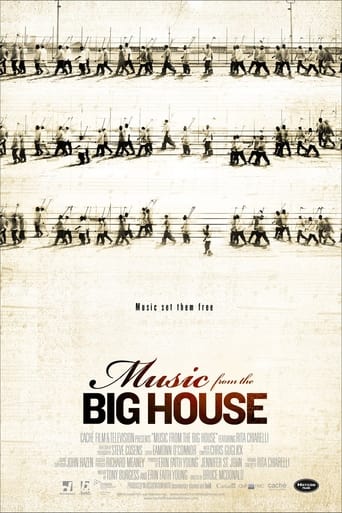pcasstjake
Music From the Big House was beautifully created to tell an impactful story in the form of a documentary. Unlike most documentaries that simply tell cold, hard facts about an issue through a monotonous narrative, MFTBH captures the mind and heart simultaneously through an image-driven journey. It follows renowned Blues artist, Rita Chiarelli in her quest through the Angola State Prison in Louisiana, were she attempts to both heal and reform inmates through experimentation with Blues music. Chiarelli deserves recognition for this spectacular film and all that she does. In our society, we tend to forget that prisoners are human too and despite their mistakes they have thoughts running through their minds and emotions coursing through their veins. She gives them a chance to prove themselves and make something of their lives, where most of us would not even dare. Throughout the documentary one develops a connections with several of the Angola Prison inmates that are interviewed. This film succeeds in helping the audience view prisoners for more than just their crimes. An unconventional feat, it is an inspiring story that attempts to progress societal views and reform the prison system. It is a must watch.
brownkt3
I can only echo what has been stated by majority of reviews here. This movie takes a warm and engaging look at the blues and roots music coming from Angola Prison Louisiana while balancing that with the reality of the men that live behind bars. We don't learn a lot about why the men are doing time, but this adds an ability to empathize without being pushed to judge those same men. The cinematography is beautifully shot and the action paced well, interspersing forward movement with history and biography. Nor does the film avoid the gritty and dismal living conditions at the prison. The music for the men in Angola becomes a much need cathartic and creative outlet. And the music itself is great. Regardless of your musical preferences it would be hard not to find sympathetic joy from seeing the performances. Chirarelli's performances are great and it's apparent from the start that she genuinely cares about the men she performs with. Overall, Music from the Big House is a great story with great music, what else could you want?
Jame-la-Ash
I can't even begin to get into the inspiration this movie gives out. How a little women goes into the prison of Angola and gives prisoners the gift of blues music, this not only touched them but me too. I have a heavy appreciation for blues music but hearing it come from men who could have given up on life changed my feelings about music. Watching people evolve and come together strictly because of the music they share among each other is a rewarding experience. There are plenty behind the scenes documentaries that shed light on prison life. I will say that this particular film is nothing like a regular boring prison documentary in respects that it paints the inmate from another point of view. I never thought getting to know people I've never met would touch me the way these random inmates did. The ending is even more surprising, it set the tone for the whole purpose of the movie.
whitehouse4219
"Music from the Big House" was a very astonishing look into life in prison and the role music plays. The inmates are all seeking a chance for redemption and appear to be in the middle of a spiritual journey. Music plays a major role for all of these men that is completely indescribable. The music they play or sing is simply raw emotion. It is their outlet or perhaps even an escape from their everyday life. Quite frankly, it means everything to them. Award winning recording artist, Rita Chiarelli, takes a trip to Angola Prison with every intention of putting on a concert for the inmates. She winds up playing alongside the inmates and creates an experience that transcends anything an audience member would expect. This experience is captured in "Music from the Big House," in a tale of music, emotion, and redemption.
